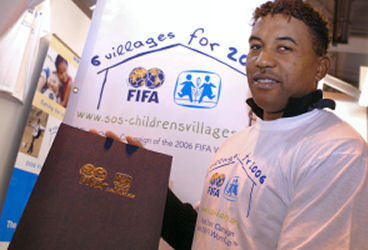Interview with FIFA/SOS Ambassador Ulises de la Cruz
08/05/2006

In March 2006, the Ecuadorian international and Aston Villa star Ulises de la Cruz joined the ever growing legion of FIFA/SOS Ambassadors and pledged his support to the charity and the "6 villages for 2006".
We were lucky enough to ask him a few questions about his career, his decision to become an ambassador for SOS Children and his hopes for this summer's World Cup...
Ulises, what made you decide to become a FIFA/SOS Ambassador?
When I was growing up in Piquiucho, my village in the north of Ecuador, I didn’t have a great deal - there was no running water, we didn’t always have money for the electricity and the education system was not well organised.
But because I was good at football I was given the opportunity to progress and that has now brought me to England and a life I could not have hoped for in Ecuador. Football has given me a great opportunity and I want to use my position to help other people.
I love children. I love to see them smile; I love to see them happy. I’m very pleased to be a FIFA/SOS Ambassador.
How do you think football can help the world’s children?
Football gave me a great opportunity and I think that many other children’s lives can also be changed for the better.
I am happy to be a FIFA/SOS Ambassador and think that I can make some positive changes in my country. FIFA is well respected in Ecuador, so SOS Children’s Village’s partnership with FIFA will encourage many people to support the charity and improve the situation in many of the poorer areas.
Now that we have qualified for the World Cup football is very popular, but 10-15 years ago no-one was interested in football. Only people in the poorer areas of Ecuador played football, where the kids kicked footballs around in the street. Wealthier people, with televisions, weren’t interested in football.
But in 2002, when Ecuador qualified for the World Cup for the first time, everything changed and suddenly people started to take notice. Football and footballers became more popular because of our success. After qualifying for this year’s World Cup in Germany, respect for the team has also grown.
I think I can use this respect to help improve the situation for many children in Ecuador.
So how many professional footballers are there in Ecuador?
There are just two leagues in Ecuador, which means there are about 500 professional footballers. There are 13 million people in Ecuador, so you can see that football is still quite a small sport.
And how do you see Ecuador’s chances at this year’s World Cup?
I think we will do well this year. The team is strong and I believe we will go beyond the group stages. We have good tactics, but I think the team would benefit if more Ecuadorians played in Europe - they would grow in strength and speed.
You’ve been drawn in the same group as Germany - what are your thoughts on that match?
Germany is a good team, but they’re not that good. I’m not nervous about playing Germany. We had to play against Brazil and Argentina in our qualifying matches, and South America has many good teams so I’m not worried about playing Germany.
You have set up your own foundation in Ecuador, can you tell us a little bit about it?
Because the facilities in my home village were not very good - there was no medical centre which meant that people had to travel 40 minutes to Ibarra, the nearest town, and children didn’t always get the education they needed - I decided to set up a foundation.
At the moment, we have a medical centre with a doctor, a nurse and a dentist and a primary school, which has about 200 pupils. We also help to modernise other buildings in the village. People from the surrounding villages have been flocking to the medical centre, so unfortunately it is not big enough for all the people who want to use it, so we’re hoping to expand. The government should be giving us a grant to help, but we’re still waiting for the money.
(Ulises met SOS Children’s Villages UK at a large Education Fair in Birmingham, and spent a number of hours looking for teaching materials that he could send back to his school in Piquiucho.)
What kind of a relationship do you have with your mother?
My mother is very important to me; I speak to her everyday. She helps me run my foundation in Piquiucho, so without her things would be quite difficult. She’s proud of what I have achieved and maybe she will come and watch me play in Germany this summer.